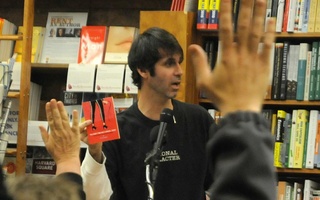If you’ve ever been on an endless hunt for, say, a classic Elizabeth Bowen novel that hasn’t seen shelves since before 1923, then the Harvard Book Store might be just the place for you. Beginning this Friday, customers can use the store’s new “Espresso Book Machine” to select a book from millions of titles now in the public domain that will be printed and bound right on the spot, presumably akin to the way that a coffee machine instantly fills a cup of coffee. Needless to say, the new machine, which works in conjunction with Google Books, is a fantastic innovation as useful as it is unbelievable.
This new piece of technology enables readers to access a vast pool of texts exponentially larger than the number of books currently crowding the shelves of the Harvard Book Store, especially those titles published pre-1923, before which copyright protections are largely inapplicable. Now, the number of unavailable, out-of-print books has—at least for customers of the Harvard Book Store and the few other nationwide stores with Espresso Book Machines—significantly diminished, and many obscure books can be accessed without the labyrinth of used booksellers and the obligatory weeks of waiting and searching.
But what is perhaps most intriguing about the book machine, however, is that it is both a technological advancement and a means of increasing access to print media, which is almost never the case with the other developments in this field. In the age of the e-book and the Amazon Kindle, it is refreshing to see the actual object of the book itself revived and sustained rather than replaced and forgotten. That said, the increased access to books—especially to more seasoned titles—that the machine creates will appeal to an older generation of readers that never embraced online technology in the first place. With this new machine, nothing is lost as a result of a technological transition. If anything, the printed book, still the fundamental core of reading for many, is better preserved.
Of course the Harvard Book Store’s “Espresso Book Machine” is an easy thing to criticize. After all, is it a solution to the print media crisis or to the problem of reading in the information age? Hardly—no matter how innovative the machine may be, its novelty must not distract us from the goal of making more texts available online. Isn’t it flawed? Absolutely—it would be nice if arrangements could be made with authors and publishers to include copyrighted materials in its catalogue. But no one has billed this machine as anything else but what it really is—an incredible device that affords readers access to an extraordinary array of titles previously unavailable with such speed and in such quantity. Instead of faulting the “Espresso Book Machine” for the questions it does not answer, skeptics should realize the magnitude of the services this machine does provide, and we admire the Harvard Book Store for being among the first to invest in such an innovative piece of technology.
Read more in Opinion
The Bucket BrigadeRecommended Articles
-
Store Launches On-Demand BooksStarting next week, customers at Harvard Book Store will be able to buy in minutes books that once would have
-
Dream of a Universal BookstoreThe challenge of looking for an elusive book is one of the singular joys of scholarship for me, part of what rescues it from becoming a mere exercise in pedantry or reinterpretation
-
 Author Prints New Book On Demand
Author Prints New Book On Demand -
 Post-Thanksgiving Treat: Pumpkin Spice Lattes
Post-Thanksgiving Treat: Pumpkin Spice Lattes -
Harvard Book Store Turns 80In 1640 in Cambridge, Mass., the Bay Psalm Book became the first book to be printed in British North America. Centuries later, and about 100 yards from the original site, the Harvard Book Store christened its newfangled print-on-demand machine by producing the Bay Psalm Book once more.
-
 Oona's Experienced Clothing To Launch Online Store
Oona's Experienced Clothing To Launch Online Store













